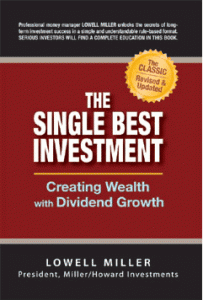Often I read books just for fun and a good time. When I'm
done with the book it's placed on the bookshelf, never to be opened again. A
few months later I hardly remember what any of those books were about. This is
not a big deal if it's a David Baldacci or Dan Brown, but for financially
related books I'd like to make a difference. In this article I’ll offer my take
on the book ‘The Single Best Investment: Creating Wealth with Dividend Growth’
by Lowell Miller.
 Well obviously the book is about dividend growth investing. First
it shows what is wrong with the current investment environment. Financial
information is everywhere and people are drowning in it. Long-term returns for
average growth funds are often higher than the returns for the average
investo
Well obviously the book is about dividend growth investing. First
it shows what is wrong with the current investment environment. Financial
information is everywhere and people are drowning in it. Long-term returns for
average growth funds are often higher than the returns for the average
investo
The goal of the strategy outlined by Miller in his book is
to earn solid returns on your investments over the long-term, with the lowest
possible risk. In order to succeed you need to make a long-term commitment to a
strategy that’s founded on reason and common sense.
Successful investing is not about ‘playing the market’; it’s
about being a partner in an enterprise. Beyond that is it about creating a kind
of compounding machine that sits quietly off in the corner working for you.
Miller explains that compounding is the money that money makes, added to the
money that money already has made. And each time money makes money, it becomes
capable of making even more money than it could before.
Successful investing is about finding the right stocks: businesses
with reliable growth that will share that growth with its owners. Fast growth
is not the goal, for fast growth is not reliable and isn’t worthy of your
patience. Buy quality companies for fair price, be patient and watch it grow!
In chapter 4 Miller offers his trademark strategy in the
form of a formula: High quality + high current dividend + high growth of
dividends = High total returns. In a nutshell the strategy is to find mature, reliable
companies with superior financial strength and excellent management. For the dividend
growth Miller advises to look for past, consistent performance of 10% growth
per year.
The chapters 5, 6 and 7 provide insight in different methods
to value a stock price. Although the most important aspect of the strategy is
to find reliable, high quality companies, it’s also necessary to value the
stocks in some manner since you don’t want to overpay for the stocks. Miller
even argues that charts can provide assistance. A prior period (+/- 6 months)
of relative weakness followed by short-term relative strength is a good
indication for buyers. Personally I’m not a big believer in charts but I guess
his advice can be classified as some sort of contra-momentum strategy. But
remember: these valuation and timing techniques are only of value once you’ve
determined that the fundamentals of the company are excellent.
The last part of the book is about the process of monitoring
your stocks. According to Miller you need to ask three important questions to
monitor your companies (or dividends):
o
Is the dividend in jeopardy? Pay-out ratio
should be no higher than 50% (based on total earnings)
o
Change in dividend policy? Watch out for
management remarks (or lack thereof).
o
Has the company failed to raise its dividends
for one year? Or even cut its dividend?
Miller stresses again the point that long-term investing is
about character, depth of vision and the cultivation of patience. It’s not
about having a great system or superior analytical intellect. To quote Miller: “An investor is a warrior: he will
continually remind himself through examination of historical results that the
path of quality and yield is unassailable and shines with increasing
superiority the longer the period of comparison becomes.”
Stop paying close attention to the price changes, the
opinions, the analysts’ earnings estimates or the talking heads on Finance 24/7
TV. Let compounding do its work! Let management be your employees! I think these
are valuable opinions. Although I really didn’t read any groundbreaking things,
it’s important to be reminded of these advices on a regular basis.
This book is fantastic, I have purchased it for several family members after I first read it.
ReplyDelete